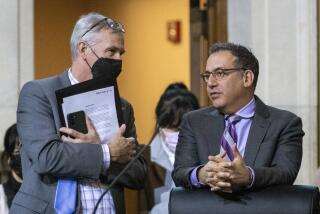Council approves $6.79-billion budget
With little disagreement or pomp, the Los Angeles City Council on Monday unanimously passed a $6.79-billion budget for the coming fiscal year that continues funding the expansion of the Police Department.
The budget puts the city on track to hire 780 more officers in the coming year, although the net gain is expected to be 235 because of retirements. The LAPD had 9,557 officers as of May 5; Mayor Antonio Villaraigosa and the council are seeking to have more than 10,000 officers in 2009.
That would be significant because the force has never had more than 9,852 officers and Los Angeles is widely considered to be under-policed compared to most major cities.
Villaraigosa has five working days to sign the budget. The mayor’s press office said that he was very pleased with the budget and will be reviewing the changes the council made to it this week.
The mayor made gang prevention the centerpiece of the budget after several high-profile gang killings in the city last year. Villaraigosa said the budget included $168 million in gang funding, although much of that money was for existing police and anti-gang programs.
But Villaraigosa can’t call the budget a total victory: The council placed $19.6 million in new anti-gang programs in the city’s “unappropriated balance” fund. That gives the council’s anti-gang committee the chance to evaluate the programs further before deciding to fund them.
“We’re going to start holding departments and agencies ... accountable for how we’re reaching our young people,” said Councilwoman Janice Hahn, a member of the anti-gang committee. “This is our opportunity to get a handle on these programs.”
Hahn then picked out a job reentry program from the list of mayor’s proposals and challenged anyone in council chambers to explain the program’s effectiveness. No explanation was offered.
Otherwise, the budget was largely an extension of last year’s financial blueprint. Council budget committee Chairman Bernard C. Parks described the spending plan as one that’s about “accountability and discipline.”
Toward that end, city officials said the so-called structural deficit -- the difference between revenues and expenses -- was reduced from more than $200 million to $93 million by shifting funds. At the same time, by holding expenses in check, the city boosted its contingency fund to more than $200 million, the highest it’s ever been.
Funding was slightly increased for sidewalk repair, tree trimming, illegal sign removal and for materials and books for the city’s library system.
But as is often the case with finances in Los Angeles, everything is relative and the city continues to struggle to find money for basic services. As Councilman Bill Rosendahl boasted Monday, the wait for tree trimming in the city will be 8.8 years instead of 10.1 years.
During budget hearings over the last two weeks, city officials also expressed concern about future budget years -- noting a confluence of forces that could devastate Los Angeles’ finances.
The big problem would occur if the real estate market continues to cool -- depriving the city of property tax revenues -- and the city loses the right to collect $270 million in cellphone taxes because of industry lawsuits.
Unlike previous years, the council sent most amendments to fund particular programs to council committees for review to determine if the money should be spent.
More to Read
Sign up for Essential California
The most important California stories and recommendations in your inbox every morning.
You may occasionally receive promotional content from the Los Angeles Times.










